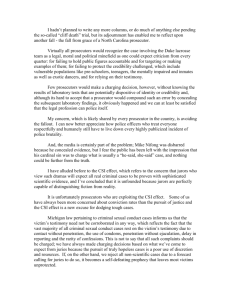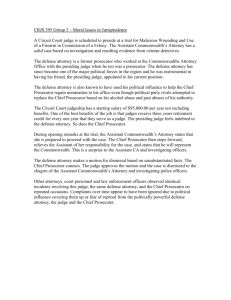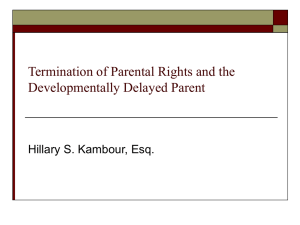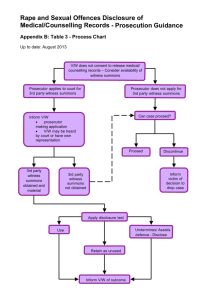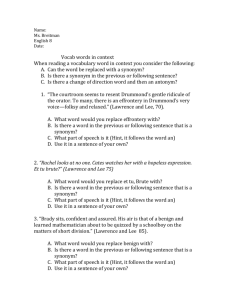the ten commandments to being a successful witness
advertisement
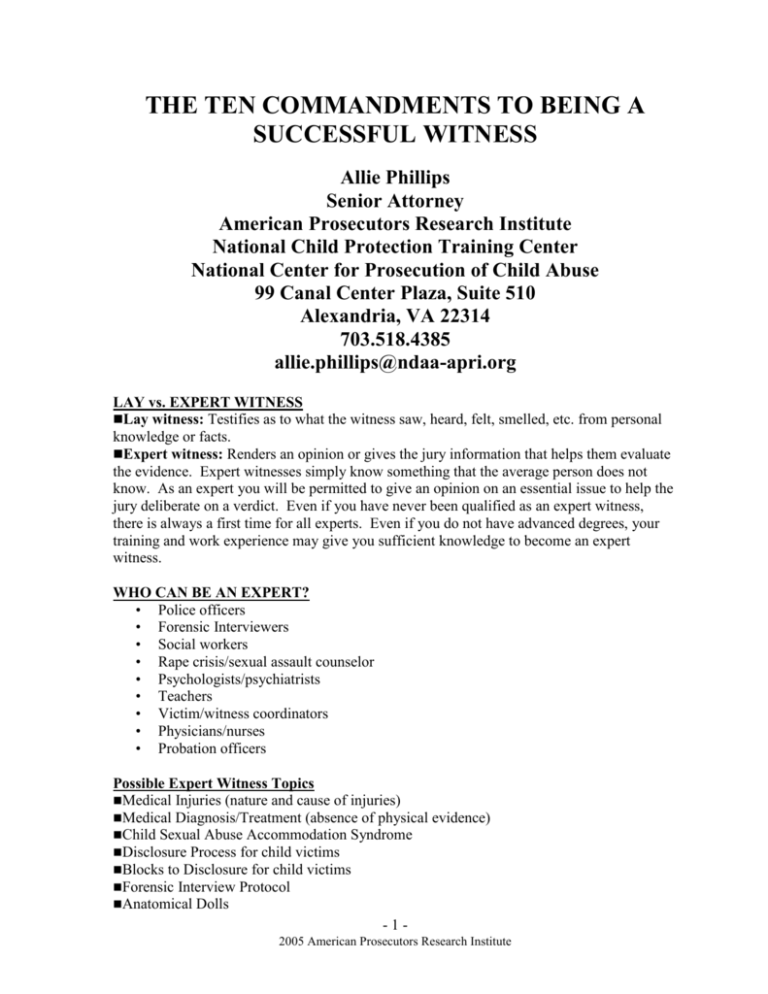
THE TEN COMMANDMENTS TO BEING A SUCCESSFUL WITNESS Allie Phillips Senior Attorney American Prosecutors Research Institute National Child Protection Training Center National Center for Prosecution of Child Abuse 99 Canal Center Plaza, Suite 510 Alexandria, VA 22314 703.518.4385 allie.phillips@ndaa-apri.org LAY vs. EXPERT WITNESS Lay witness: Testifies as to what the witness saw, heard, felt, smelled, etc. from personal knowledge or facts. Expert witness: Renders an opinion or gives the jury information that helps them evaluate the evidence. Expert witnesses simply know something that the average person does not know. As an expert you will be permitted to give an opinion on an essential issue to help the jury deliberate on a verdict. Even if you have never been qualified as an expert witness, there is always a first time for all experts. Even if you do not have advanced degrees, your training and work experience may give you sufficient knowledge to become an expert witness. WHO CAN BE AN EXPERT? • Police officers • Forensic Interviewers • Social workers • Rape crisis/sexual assault counselor • Psychologists/psychiatrists • Teachers • Victim/witness coordinators • Physicians/nurses • Probation officers Possible Expert Witness Topics Medical Injuries (nature and cause of injuries) Medical Diagnosis/Treatment (absence of physical evidence) Child Sexual Abuse Accommodation Syndrome Disclosure Process for child victims Blocks to Disclosure for child victims Forensic Interview Protocol Anatomical Dolls -12005 American Prosecutors Research Institute Child Development Suggestibility issues in young children Post-Traumatic Stress Disorder Rape/sexual assault trauma Investigation techniques HOW DOES AN EXPERT STATE AN OPINION? The evidence is consistent with. . . Do not say the victim is telling the truth Do not say the child has been molested/abused Do not say the accused in guilty Expert witnesses give opinions based on the evidence and cannot testify that something actually happened The 10 Commandments of Testifying 1st Commandment: PRE-TRIAL PREPARATION Maintain a curriculum vitae (professional resume) • EDUCATION, DEGREES • EMPLOYMENT • NUMBER OF CHILD ABUSE INVESTIGATIONS • SPECIALIZED CHILD ABUSE TRAINING • CONTINUING EDUCATION • AWARDS • BOARD CERTIFICATIONS/ LICENSES • PRIOR COURT APPEARANCES • ADVISORY BOARDS • EDITORIAL BOARDS • PROFESSIONAL ORGANIZATIONS • PRESENTATIONS • PUBLICATIONS Know your own area of expertise Know the adverse material Know the vulnerable areas Know your case 2nd Commandment: MEET WITH THE PROSECUTOR OR ATTORNEY Be proactive Read your report Discuss expectations of your testimony Review potential areas of attack Prepare for areas of impeachment Discuss theme and theory of the case -22005 American Prosecutors Research Institute Define defense goals Review evidence Practice questions 3rd Commandment: The P’s BE PROFESSIONAL Dress in business attire Act appropriate inside and outside the courtroom because jurors may be watching you Be aware of your body language on the witness stand Avoid taking notes to witness stand Remove personal notes from your reports Avoid distracting mannerisms Do not be obvious when looking for help from the prosecutor/attorney Make eye contact with jury (they are evaluating your testimony) The professional tone of your voice gives you credibility Be honest, fair and object Be purposeful in your answers Do not volunteer information Avoid estimating or guessing BE PROMPT Please arrive at the courthouse on time. Many prosecutors/attorneys are controlled by the Judge on when to call witnesses to the stand. If a witness is not present, the prosecutor/attorney bears the brunt of the judge’s displeasure. Please be patient. BE POLITE Do not argue Be courteous Do not be condescending Remember that the jurors may be watching you. BE PREPARED Always read your report before testifying. 4th Commandment: KEEP IT SIMPLE When testifying, remember to speak in clear terms so that the jury (often having only a high school education or less) can understand what you are saying. If you speak in professional terms, the point of your testimony will not reach the jury. 5th Commandment: BE A VISUAL WITNESS Speak with the prosecutor or attorney about using charts, graphs, computerized presentation or overhead projector to show any physical evidence to the jury. In a day of courtroom TV dramas, jurors expect to have visual graphics during a trial. -32005 American Prosecutors Research Institute 6th Commandment: BE ON GUARD WITH THE DEFENSE ATTORNEY When you take a defensive posture on the witness stand (cross your arms), speak in a condescending voice, or argue with the defense attorney, you are only diminishing your own powerful testimony. Even if the defense attorney treats you with disrespect, treat him/her with the same manner you did the prosecutor or attorney who called you to the witness stand. This will give you more credibility in the eyes of the jurors and judge. What should you do if the defense attorney contacts you in your office? o Immediately notify your prosecutor/attorney o Discuss the pros and cons of meeting with the defense attorney o Discuss the method of meeting with the defense attorney o If you agree to speak with the defense attorney, this shows that you are fair, open and have nothing to hide (this is recommended) o Send follow-up letter regarding the conversation to avoid any confusion GOALS OF DEFENSE ATTORNEYS DURING YOUR CROSS EXAMINATION: Secure admissions to help their client Undermine prosecution expert’s opinion Create hostility to undermine credibility Introduce evidence through your testimony which contradicts the prosecutions’ theory of the case Introduce a history of error in the investigation or medical treatment order to reduce the weight and credibility the jury gives to your testimony Try to put a negative “spin” on your prior experience as a prosecution witness HOW TO MAXIMIZE YOUR CREDIBILITY DURING CROSS EXAMINATION Maintain control Listen to the question If you make a mistake, correct it as soon as possible Don’t ramble Don’t play games Avoid being hostile and confrontational WHEN ASKED ABOUT AN ARTICLE OR RESEARCH STUDY, ASK YOURSELF OR YOUR ATTORNEY: • Does the article exist? • Are you familiar with the article? • Is the article relevant to an issue in this case? • Who authored the article? • When was the article published? • Is the information current? • Where has the article been published? • Has the article been peer-reviewed. • Has the article been accepted in the field? -42005 American Prosecutors Research Institute 7th Commandment: LISTEN TO AND JUST ANSWER THE QUESTION IF YOU ARE GIVEN A HYPOTHETICAL QUESTION: Be on guard Take notes Listen carefully to the elements included in the fact scenario Ask for the question to be READ back Note and state inconsistencies Take your time Discuss with the prosecutor before trial 8th Commandment: DO NOT BE A PUPPET! TAKE CONTROL OF YOUR ANSWERS: I need to explain, but the answer would be… I’m sorry, that question can not be answered yes or no. The issue is not that simple. A yes or no answer would be misleading as the issue is more complicated and needs to be explained. 9th Commandment: DO NOT BECOME A TARGET We have all seen witnesses/investigators become the target of the case in order to distract the jury from the real issue. If you get a sense prior to trial that you may be a target, please talk your prosecutor/attorney about how to best minimize this tactic. 10th Commandment: DEBRIEF WITH THE PROSECUTOR/ATTORNEY AFTER YOUR TESTIMONY All witnesses can become better by simply spending a few minutes with the prosecutor/attorney to find out where their strengths and weaknesses lie in their courtroom appearance, demeanor and style of testimony. -52005 American Prosecutors Research Institute
